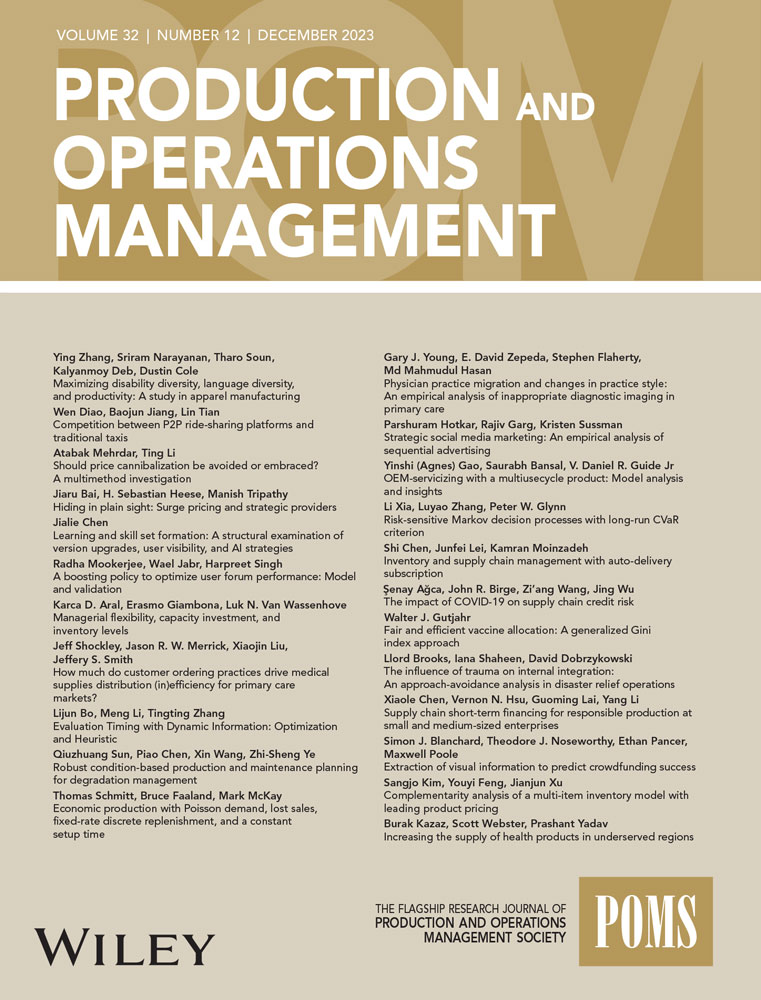EXPRESS: Made Better by Others? When Having More Diverse Colleagues Improves Individual Outcomes
IF 4.8
3区 管理学
Q1 ENGINEERING, MANUFACTURING
引用次数: 0
Abstract
Research suggests that workgroup diversity influences various group and organizational-level outcomes. However, few studies consider its impact at the individual level, particularly in knowledge-related work, where workers have considerable discretion in making decisions. Our study aims to fill this gap by examining two significant types of workgroup diversity – gender diversity, a kind of bio-demographic diversity, and specialization diversity, a kind of job-related diversity – in a healthcare setting. Using detailed data on the entire patient population of Florida hospitals (10.14 million patients), including 25,187 physicians across 240 hospitals over a period of four years, we find that physicians who work in departments with more diverse colleagues (in terms of gender and specialization) have better patient outcomes, for example, a shorter stay, lower cost of treatment and increased likelihood of discharge to home. We find that the impacts of colleague diversity are contingent on departmental focus. Our research shows that specialization diversity, a type of job-related and deep-level difference, especially helps physicians who work in more specialization-diverse departments perform better when their departments are less focused. In contrast, we find that physicians in more gender-diverse departments perform even better when in more focused departments. Our results are robust to alternate explanations and biases arising from patient selection, population demographics, and endogeneity in diversity measures. Our study adds to a relatively small literature in operations management that considers how workgroup diversity (beyond diversity in on-the-job experience) might influence individual performance. Our research also contributes to the emerging conversation on why hiring managers should actively work toward improving workplace diversity.快递:因他人而更好?拥有更多不同背景的同事何时能改善个人成果
研究表明,工作群体的多样性会影响各种群体和组织层面的结果。然而,很少有研究考虑其对个人层面的影响,尤其是在与知识相关的工作中,因为在这些工作中,员工在做出决定时有很大的自由裁量权。我们的研究旨在填补这一空白,研究了医疗机构中两种重要的工作群体多样性--性别多样性(一种生物人口多样性)和专业多样性(一种与工作相关的多样性)。通过使用佛罗里达州医院所有患者(1014 万患者)的详细数据,包括 240 家医院的 25187 名医生在四年内的详细数据,我们发现,与更多样化的同事(在性别和专业方面)一起工作的医生,其患者治疗效果更好,例如,住院时间更短、治疗费用更低,出院回家的可能性更大。我们发现,同事多样性的影响取决于科室的侧重点。我们的研究表明,专业多样性是一种与工作相关的深层次差异,尤其有助于在专业多样性更强的科室工作的医生在科室重点不突出时取得更好的业绩。与此相反,我们发现在性别更加多元化的科室工作的医生,在工作重点更加突出的科室工作时,表现会更好。我们的研究结果对其他解释以及由患者选择、人口统计和多样性测量的内生性引起的偏差都是稳健的。我们的研究为运营管理领域相对较少的文献增添了新的内容,这些文献考虑了工作组的多样性(除了在职经验的多样性)如何影响个人绩效。我们的研究还有助于新出现的关于招聘经理为何应积极努力提高工作场所多样性的讨论。
本文章由计算机程序翻译,如有差异,请以英文原文为准。
求助全文
约1分钟内获得全文
求助全文
来源期刊

Production and Operations Management
管理科学-工程:制造
CiteScore
7.50
自引率
16.00%
发文量
278
审稿时长
24 months
期刊介绍:
The mission of Production and Operations Management is to serve as the flagship research journal in operations management in manufacturing and services. The journal publishes scientific research into the problems, interest, and concerns of managers who manage product and process design, operations, and supply chains. It covers all topics in product and process design, operations, and supply chain management and welcomes papers using any research paradigm.
 求助内容:
求助内容: 应助结果提醒方式:
应助结果提醒方式:


